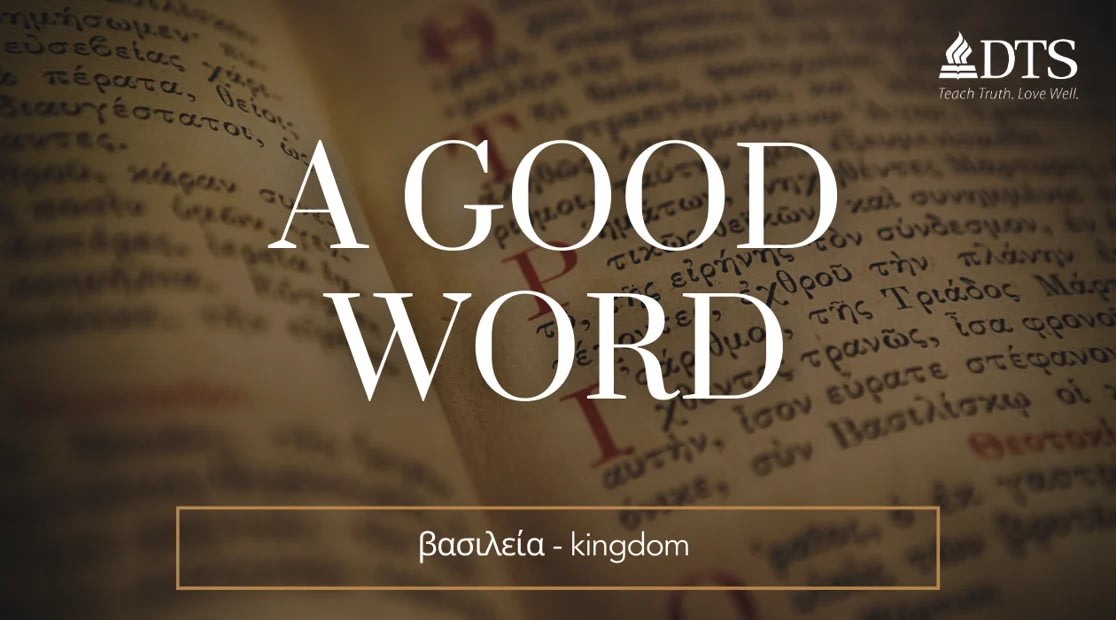A Good Word: βασιλεία – Kingdom

“A long time ago in a kingdom far, far away…” Many of us are familiar with this fairy-tale beginning to children’s stories. Upon hearing these delightful words, we know we are in for a treat—a story of knights and princesses, magic and dragons! We’re transported to a kingdom where good is victorious and evil is vanquished. We don’t have medieval, fairy-tale kingdoms today, but kingdoms still exist. They aren’t home to knights and dragons, but rather rulers and political powers. God Himself also rules over a kingdom; through this kingdom, He will accomplish His purposes for humanity through Christ, His Son.
The Greek word for “kingdom” in the New Testament is βασιλεία (basileia), which has two related meanings. On the one hand, it can mean “territory ruled by a king,” which is commonly translated as “kingdom.” This is largely what the English word means.1 On the other hand, it can mean “act of ruling,” which could be translated as “kingship, royal rule.”2 (This meaning is not generally associated with the English word.) The former meaning focuses on geography, the area over which the king exercises authority; the latter focuses on power, the dominion which the king exercises.
The Bible recognizes the reality of earthly kingdoms that exercise power over a particular area. We recognize them as nations, political states, and governments. This is what Satan tempted Jesus with when he offered Him all the kingdoms of the earth (Matthew 4:8–9; Luke 4:5–7). But the New Testament testifies of a kingdom ruled over by God with Christ as its King! The book of Matthew refers to this as the kingdom of heaven (e.g., Matthew 4:17), and the rest of the New Testament refers to this as the kingdom of God (e.g., Mark 1:15). God’s kingdom is heralded by the gospel, the good news about Jesus (Matthew 4:23). God’s kingdom will ultimately overtake the whole world (Revelation 11:15)! It’s no wonder, then, that believers long for Christ’s return when he will establish that kingdom (1 Timothy 4:8).
The kingdom of God, as testified in the New Testament, is the manifestation of God’s rule over the people He loves in Jesus Christ. Our Lord’s teachings, miracles, death, and resurrection established Him as the King. He presently reigns over the church, and He will one day return to earth to rule over the full and final manifestation of God’s kingdom. And that kingdom is no fairy tale! Believers can rejoice that our great God rules over His kingdom, and we can trust that Jesus Christ will bring this kingdom at His coming. Now that’s a story worth telling!
1“Kingdom.” Merriam-Webster.com Dictionary, Merriam-Webster, https://www.merriam-webster.com/dictionary/kingdom. Accessed 30 April 2023. 2William Arndt et al., A Greek-English Lexicon of the New Testament and Other Early Christian Literature (Chicago: University of Chicago Press, 2000), 168-69. Logos Bible Software.
About the Contributors

Michael H. Burer
Before beginning his faculty service Dr. Burer worked for many years with Bible.org as an editor and assistant project director for the NET Bible. He was also instrumental in the completion of the New English Translation-Novum Testamentum Graece diglot, published jointly by Bible.org and the Deutsche Bibelgesellschaft of Stuttgart, Germany. An ordained minister, Dr. Burer is active in his local church and has ministered frequently with The Evangelical Alliance Mission in France. He has served as a visiting teacher at the Faculté Libre de Théologie Évangélique in Vaux-sur-Seine, France. His research and teaching interests include Greek language and exegesis, the Gospels, and Jesus studies.
